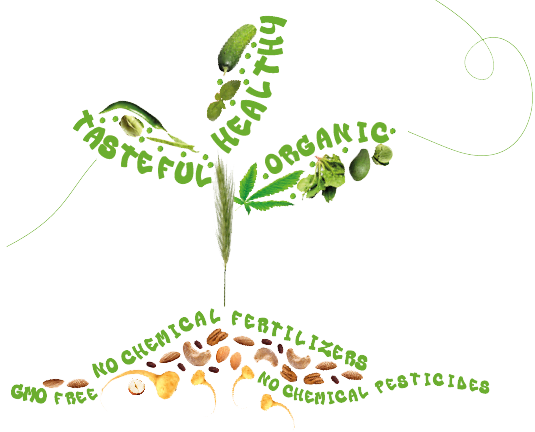You say de Smaakspecialist, you say organic. It is our dream to make organic food accessible to as many people as possible. And to achieve that we are working day in and day out with love and passion to develop, produce and distribute organic products.
Why organic, you might think? We sincerely believe that it is our responsibility to take good care of our earth, with attention for people, animals and nature. All the choices we make are always with the health of the earth in mind, and organic food, we believe, can have a great impact on that health.
Organic products are pure, of high quality and have high nutritional values. We stand for organic, because it is good for your body, good for the world and above all tasteful!

Organic food is produced under the most natural conditions possible, creating the healthiest possible ecosystem. In agriculture it means working with compost and natural manure, without chemical-synthetic aids (pesticides) and GMO (genetically modified) free. De Smaakspecialist carefully chooses raw materials and works with organically certified suppliers. When processing food, it is important to keep the products as pure and natural as possible, without artificial flavors, colors and preservatives.
Organic food must meet strict requirements and is inspected at the farmer, the producer and in the store. Skal Biocontrole is an independent supervisor committed to the demonstrable reliability of organic products in the Netherlands. Only when all requirements are met may products carry the European label for organic agriculture, the well-known green leaf. Compliance with the European rules from the government is also strictly monitored. De Smaakspecialist is proud that our products may carry the European label.
Vital soil & less CO2
Just as we need to feed our bodies, you also need to feed the soil on which crops grow. If a farmer does not nourish his land it becomes infertile, diseased and practically lifeless. Less intensive use of the land, as little pesticide and fertilizer as possible, and crop rotation in organic farming contribute to soil vitality. Research also shows that organic farming, which contributes to a well-nourished soil, fixes more CO2 than regular farming. Thus, it reduces the amount of CO2 in the atmosphere.
In regular agriculture, artificial fertilizers, pesticides and chemicals are added to the land and the land is plowed twice a year. Plowing the land releases CO2, while storing little to no carbon from the plants in the soil.
Fertile clean earth
In addition, because no chemical pesticides are used in organic production, these harmful substances cannot get into the drinking water through the soil either. In addition, products can be grown on a healthy piece of land for a very long time, without depletion. Therefore, in the long run, the production of organic crops is much higher per square meter than regular agriculture. Thus, we can ultimately produce more food with the natural resources we have.
Organic farming
So what exactly does an organic farmer do differently than in mainstream farming? An organic farmer:
Organic agriculture aims to self-regulate nature and maximize the resilience of organisms, which strengthens ecosystems. Biodiversity is measured by numbers and diversity of living organisms within an ecosystem. The approach of organic farmers supports and encourages this biodiversity. For example, more (wild) plant species, insects and microorganisms are found on organic farms. Think of the bee that is threatened with extinction. This in turn has to do with the renunciation of chemical pesticides, organic fertilization, crop rotation and less intensive use of the landscape.
In organic livestock farming, there are strict requirements for keeping the animals, such as stall space, outdoor runs, animal nutrition and health care. The basic principle is that the farmer takes into account the natural needs and behavior of an animal as much as possible, within the limits of what is economically feasible. For example, the beaks of organic chickens are not cut and the chickens always have free access to the outdoors.
Human health cannot be separated from healthy ecosystems with healthy soil, crops and animals. Therefore, in organic production, fertilizers, veterinary drugs and additives that could have health effects are avoided as much as possible. In addition, organic farming does not allow fertilizers and pesticides to enter the surrounding water.